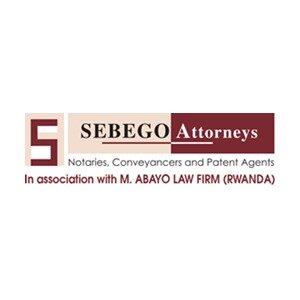Best Art & Cultural Property Law Lawyers in Botswana
Share your needs with us, get contacted by law firms.
Free. Takes 2 min.
Or refine your search by selecting a city:
List of the best lawyers in Botswana
About Art & Cultural Property Law in Botswana
Art & Cultural Property Law in Botswana is a niche area of law focused on the protection, management, and preservation of the country's rich cultural heritage and artistic expressions. This includes regulation surrounding the creation, ownership, distribution, and international export of art and cultural artifacts. Botswana recognizes the intrinsic value of its cultural assets and works to preserve these through various laws and agreements. It involves a combination of intellectual property rights, cultural heritage laws, and international treaties to protect and manage cultural property effectively.
Why You May Need a Lawyer
Several situations may necessitate seeking legal advice in the context of Art & Cultural Property Law in Botswana:
- If you are involved in creating or distributing art, you may need legal assistance to secure intellectual property rights.
- If you wish to export or import cultural artifacts, you must ensure compliance with the relevant regulations and treaties.
- If you are involved in a dispute over the ownership or authenticity of an art piece or cultural property, legal guidance can be crucial.
- If you are facing issues of infringement or unauthorized use of art, whether as an artist or a collector.
- In case you are part of a community seeking to protect its cultural heritage from unauthorized exploitation or destruction.
Local Laws Overview
Botswana's legal framework for Art & Cultural Property Law is built around several key statutes and international agreements:
- The Copyright and Neighboring Rights Act ensures that artists receive appropriate recognition and compensation for their work.
- The National Museum and Art Gallery Act focuses on the protection and preservation of cultural properties and heritage.
- The Monuments and Relics Act regulates the preservation of historical sites and artifacts.
- Botswana is a signatory to international treaties such as the 1970 UNESCO Convention, influencing how cultural property is handled across borders.
Frequently Asked Questions
What is considered cultural property in Botswana?
Cultural property includes physical artifacts, artworks, monuments, and any materials that are considered historically or artistically significant to Botswana's heritage.
Do I need permission to export cultural artifacts from Botswana?
Yes, exporting cultural artifacts often requires special permits from relevant authorities to ensure compliance with international agreements and local regulations.
How can I protect my artwork from unauthorized reproduction?
Artists can register their works under the Copyright and Neighboring Rights Act for protection against unauthorized reproduction and use.
What should I do if I discover an artifact on my property?
You should report the discovery to the National Museum or relevant authorities, as certain artifacts are protected under the Monuments and Relics Act.
Are there specific laws for traditional knowledge and folklore?
Yes, Botswana recognizes the need to protect traditional knowledge and folklore, applying intellectual property laws in a manner that respects cultural rights.
How do museums deal with artifacts of uncertain provenance?
Museums are encouraged to verify the provenance of artifacts and work with legal frameworks to handle disputes or claims regarding rightful ownership.
Can I sell NFT representations of my art in Botswana?
NFTs involve unique digital rights and are subject to copyright laws. It's advisable to consult with a lawyer to understand your rights and obligations fully.
What are the penalties for violating cultural property laws?
Penalties can vary ranging from fines to imprisonment, depending on the severity of the offense and the specific laws breached.
Who oversees the enforcement of cultural property laws?
The Ministry of Youth, Sports and Culture Development, alongside other regulatory bodies such as the National Museum, are primarily responsible for enforcement.
Can I legally purchase cultural artifacts in Botswana?
Yes, as long as the artifacts are obtained legally and all necessary documentation and permissions are secured according to the Monuments and Relics Act.
Additional Resources
For more information, consider reaching out to the following resources:
- The National Museum of Botswana for issues related to cultural artifacts.
- The Ministry of Youth, Sports and Culture Development for cultural property regulations.
- Intellectual property offices for guidance on art rights and copyright matters.
- Legal aid centers for general legal advice concerning art and cultural laws.
Next Steps
If you require legal assistance in Art & Cultural Property Law, follow these steps:
- Identify the specific legal issue or requirement you have.
- Gather all necessary documentation related to your case, project, or artifact.
- Contact a lawyer specializing in Art & Cultural Property Law to discuss your case.
- Consider joining local cultural organizations for ongoing support and advice.
By taking these steps, you can navigate the complex area of Art & Cultural Property Law in Botswana more effectively, protecting your interests and contributing to preserving the nation's cultural heritage.
Lawzana helps you find the best lawyers and law firms in Botswana through a curated and pre-screened list of qualified legal professionals. Our platform offers rankings and detailed profiles of attorneys and law firms, allowing you to compare based on practice areas, including Art & Cultural Property Law, experience, and client feedback.
Each profile includes a description of the firm's areas of practice, client reviews, team members and partners, year of establishment, spoken languages, office locations, contact information, social media presence, and any published articles or resources. Most firms on our platform speak English and are experienced in both local and international legal matters.
Get a quote from top-rated law firms in Botswana — quickly, securely, and without unnecessary hassle.
Disclaimer:
The information provided on this page is for general informational purposes only and does not constitute legal advice. While we strive to ensure the accuracy and relevance of the content, legal information may change over time, and interpretations of the law can vary. You should always consult with a qualified legal professional for advice specific to your situation.
We disclaim all liability for actions taken or not taken based on the content of this page. If you believe any information is incorrect or outdated, please contact us, and we will review and update it where appropriate.
Browse art & cultural property law law firms by city in Botswana
Refine your search by selecting a city.












